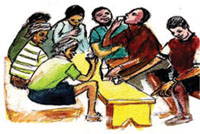Alcohol

The effects of alcohol are noticeable in all spheres (physical, psychological, social, and economic) of the lives of alcohol drinkers. Alcohol has immediate effects leading to intoxication (drunkenness), and long-term effects which can include addiction. Many years of heavy alcohol use can lead to chronic diseases and early death. Alcohol is a major avoidable risk factor for cardio-vascular disease, liver disease and cancer. It is also associated with STIs, including HIV, and unwanted pregnancy because alcoholic intoxication leads to risky sexual behaviour. Alcoholic intoxication is also the cause of violent behaviour and accidents, which can result in deaths and disability and intoxicated young people are also predisposed to commit suicide.
Stop reading for a moment and think whether you know any young person in your community who is affected by alcohol? In what ways is this person affected? Who else is affected by their behaviour?
If you know of a young person who is inclined to drink too much or is very often drunk you might have had the thought that the effects of alcohol go beyond the individual drinker. The drinker's behaviour can affect other family members and the community. Some of these adverse effects are presented in Table 7.1.
Table 7.1 The Effects of Alcohol on Young People.
| School | Family | Social | Legal |
|---|---|---|---|
| Inefficiency | Frequent fights | Distance from friends | Disobeying rules |
| Poor performance | Neglect of family duties | Misbehaviour with others | Thefts and petty crimes |
| Frequent absence | Physical violence with family members | Decreased social reputation | Involvement with criminal gangs |
| Accidents in school | Long absence and running away from home | Social isolation | Arrests and court cases |
| Suspension from school | Rejection | Constant borrowing | Conviction |
| Inability to return borrowed money | Imprisonment | ||
| Fights, quarrels, theft |
As you see from the table, alcohol use affects more than the health of the individual user; it has multiple effects on all aspects of the drinker's life.
In what ways does alcohol affect sexual and reproductive health?
Alcohol affects sexual and reproductive health in less visible ways too. Excessive drinking can shrink the genitals. It can lead to infertility in men because it kills the cells that are producing sperm. It also makes a woman less fertile and she may have difficulty conceiving. If she does become pregnant she is at a greater than normal risk of miscarriage or bearing an underweight baby that is either stillborn or born pre-term. Alcoholic mothers have a very high risk (around 40%) of their child suffering from fetal alcohol syndrome. These children are mentally retarded and have other growth defects; they have heart and brain abnormalities and behavioural problems. Many have a somewhat strange facial expression (Figure 7.2).

If a young person who has been drinking too much ceases their drink habit they should find their fertility is restored within a few months. A young woman who finds she is pregnant should stop drinking through the rest of her pregnancy, however, if she was drinking heavily when she conceived and in the weeks before she realised she was pregnant her baby's brain may already be damaged. Maternal over consumption of alcohol is the major non-genetic cause of mental retardation.